Sponsorship letter for uk visa template
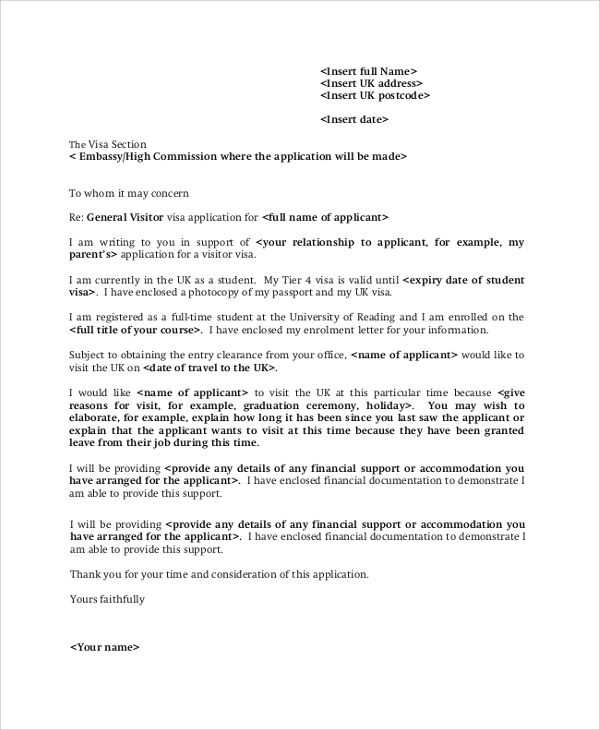
If you plan to invite someone to the UK, you must provide a sponsorship letter as part of their visa application. This letter demonstrates that you will be responsible for their stay and assures UK authorities of their financial and accommodation support. A well-structured sponsorship letter can make all the difference in the approval process, ensuring that your invitation is taken seriously.
Your sponsorship letter should include key details like your personal information, the applicant’s details, and a clear commitment to cover their expenses during their stay. Make sure to include specifics about the relationship with the applicant, the purpose of their visit, and the duration of their stay. A well-crafted letter assures the UK immigration authorities that the visitor is not likely to overstay or become a financial burden.
Below is a template to guide you in writing an effective sponsorship letter. This format ensures you provide all the required information in a clear and concise manner, increasing the chances of your invitee receiving their UK visa smoothly.
Here’s the revised text with minimal repetition:
Ensure the letter is addressed to the correct person and mentions the visa applicant’s full name, passport number, and relationship to the sponsor. Include the sponsor’s full details: name, address, contact information, and employment status.
Be specific about the purpose of the visit, including the planned dates and location. Detail how the applicant will be financially supported during their stay, including accommodation and travel costs. If applicable, state that the sponsor will cover all expenses.
If the sponsor is providing accommodation, mention the address, type of accommodation, and available facilities. Confirm that the sponsor’s place is suitable for the applicant’s stay and that it meets all necessary requirements.
Provide details about the sponsor’s legal status in the UK and their ability to support the applicant. This could include information on the sponsor’s citizenship, permanent residence, or work visa status, if relevant.
- State clearly that the sponsor understands the responsibilities they are taking on, including ensuring the applicant complies with UK immigration laws.
- Include a statement that the sponsor is willing to assist in any legal or official matters that may arise during the applicant’s stay.
Finally, include the sponsor’s signature and the date. If needed, attach supporting documents, such as proof of income, bank statements, or a copy of the sponsor’s passport.
- Sponsorship Letter for UK Visa Template
A sponsorship letter is an important document when applying for a UK visa. It serves as proof that someone in the UK is supporting your trip and is responsible for your stay. Below is a straightforward template you can follow when writing your sponsorship letter.
Start by including the sponsor’s full name, address, and contact details. Specify your relationship with the sponsor (e.g., friend, family, employer). Mention the purpose of your visit and the dates you intend to stay. Clearly state that the sponsor is willing to cover all or part of your expenses during the trip, including accommodation, travel, and daily living costs.
In the letter, include a section where the sponsor confirms their legal status in the UK, such as whether they are a British citizen or a permanent resident. They should also provide details about their employment or financial situation to show they can support you during your stay.
The sponsor should sign the letter at the end and include any necessary documents, such as a copy of their passport, utility bill, or bank statement, to further demonstrate their eligibility and financial ability to support you.
Make sure the tone is formal, and the information is clear and accurate. A well-detailed sponsorship letter strengthens your visa application and increases the likelihood of approval.
Start with a clear introduction, stating your relationship with the applicant, your full name, and contact details. Make sure to mention your status in the UK (e.g., citizen or resident), and specify the purpose of the letter: supporting the applicant’s visa application.
Key Components to Include:
- Your personal details: Name, address, contact details, and relationship with the applicant.
- Applicant’s details: Full name, date of birth, and passport details.
- Visa details: The type of visa the applicant is applying for (e.g., tourist, student, etc.) and intended travel dates.
- Financial support: Clearly explain how you will support the applicant financially during their stay, including accommodation and living costs.
- Accommodation details: Address of where the applicant will stay, whether with you or at another location.
- Reason for visit: Outline why the applicant is visiting the UK and provide any relevant details about their visit (e.g., tourism, business, family visit).
- Commitment to return: Mention any reasons the applicant is likely to return to their home country, such as family, work, or property.
Final Touches:
End the letter by reaffirming your support and commitment. Include your signature, full name, and date. Make sure the tone remains professional and that all information is accurate.
Key Information to Include in Your Sponsorship Letter
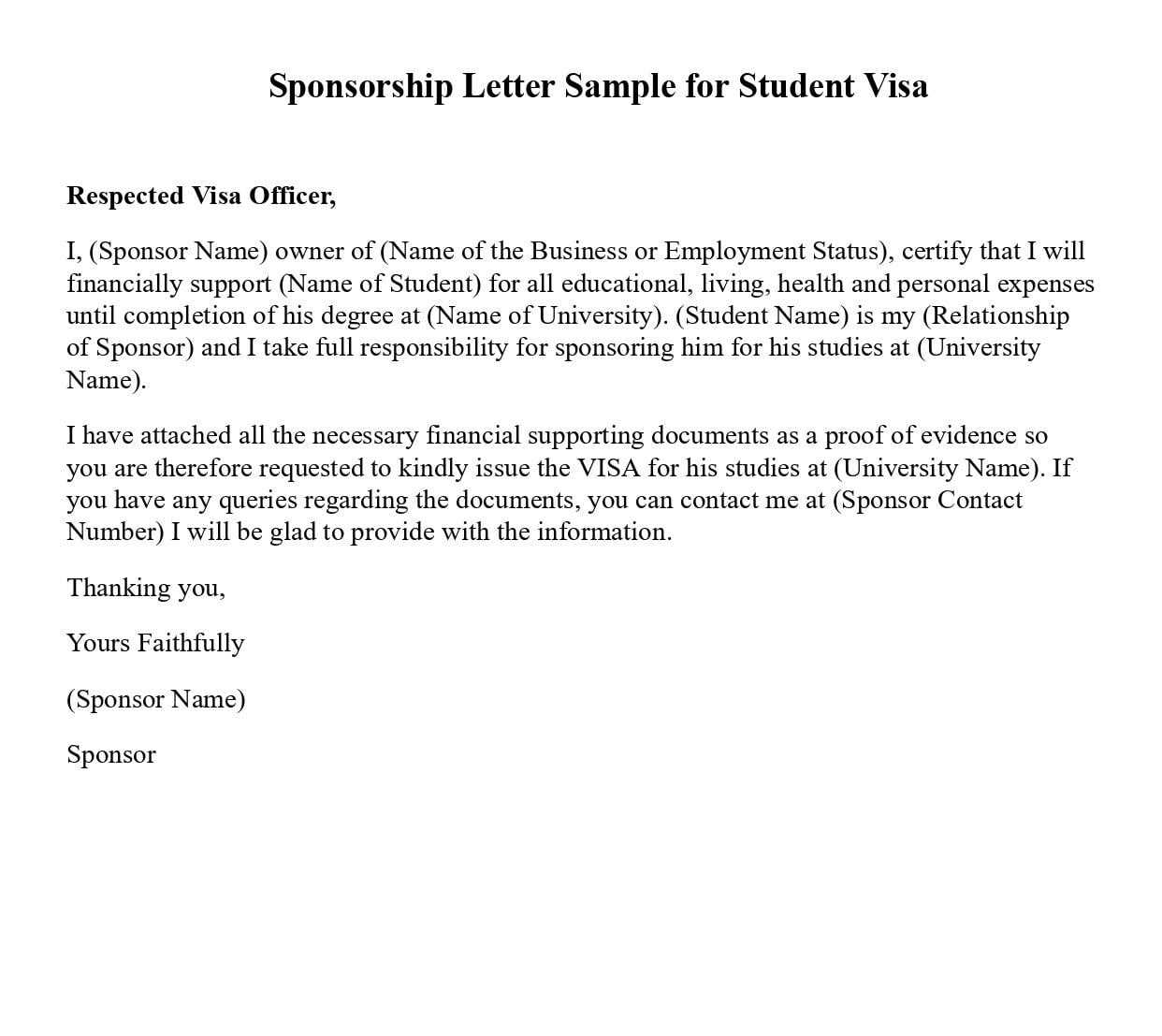
Ensure your sponsorship letter is clear, accurate, and well-structured. Including the right information will help the visa officer understand your intentions and your relationship with the applicant. Here’s what to include:
- Your Full Name and Address: Include your full legal name, current address, and contact details (phone and email). This verifies your identity as the sponsor.
- Your Status in the UK: Specify whether you are a British citizen, permanent resident, or on another type of visa. Include supporting documents like a passport copy or residence permit if necessary.
- Details of the Applicant: Include the full name, date of birth, relationship to you, and passport details of the person you are sponsoring. Ensure these match the applicant’s travel documents.
- Purpose of the Visit: Clearly state why the applicant is visiting the UK (e.g., tourism, family visit, business). Be specific about the duration of stay and any planned activities.
- Financial Support: Explain how you will financially support the applicant during their stay. Include details about your income, employment, or savings. Attach relevant bank statements or payslips as proof.
- Accommodation Details: Confirm where the applicant will stay during their visit. If they will stay with you, mention your address and the living arrangements. If they will stay elsewhere, provide relevant details.
- Commitment to Cover Additional Costs: State that you will cover any additional expenses such as medical costs or emergency situations. Be clear about the extent of your financial responsibility.
- Endorsement of Applicant’s Return: Assure that the applicant will leave the UK at the end of their visit. Mention their ties to their home country (e.g., employment, family, property) as reasons for their return.
Supporting Documents
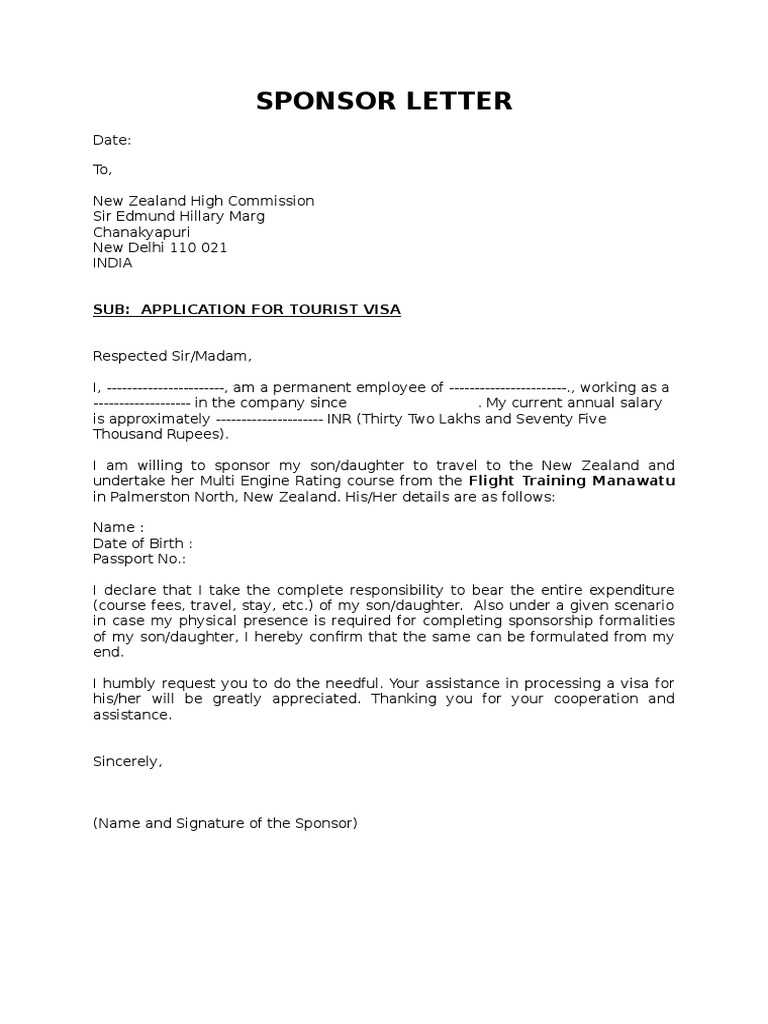
Along with the letter, provide any necessary documents to back up your claims. These may include copies of your passport, proof of address, financial statements, and evidence of your relationship with the applicant.
Closing Statement
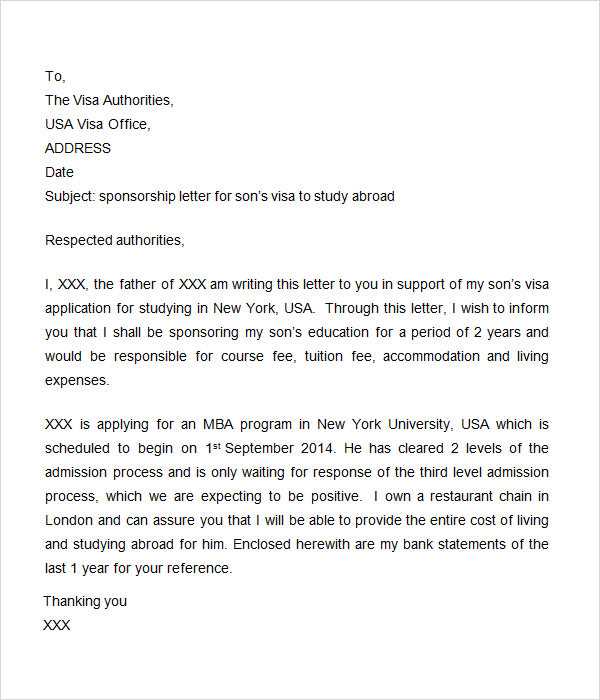
End the letter with a polite conclusion, offering your full support and expressing your readiness to provide further information if required.
Common Mistakes to Avoid When Writing a Sponsorship Letter
Avoid vague language. Ensure the letter is clear and direct about the relationship with the applicant and the commitment being made. Specific details like the applicant’s name, intended visit dates, and purpose should be included without generalization.
Don’t skip necessary details. Omitting vital information like financial support, accommodation arrangements, and your legal status in the UK can lead to rejection. Clearly outline the support you’re offering and provide evidence where possible.
Stay professional and avoid emotional language. A sponsorship letter should maintain a formal tone throughout. Avoid using overly casual phrases or expressing personal feelings that are not relevant to the application.
Ensure proper formatting. A messy letter with inconsistent formatting may confuse the visa officer. Use clear paragraphs, proper punctuation, and a structured format. The letter should be easy to read and follow.
Avoid errors in personal information. Double-check all personal details, such as your address, passport number, and the applicant’s details. Even small mistakes can cause delays or issues in processing.
Don’t forget signatures. A letter without a signature, especially if it is handwritten, may not be considered valid. Ensure you sign the letter, and if applicable, notarize it to confirm its authenticity.
Don’t make unsupported claims. If you promise to cover certain expenses or support the applicant in specific ways, make sure that this can be backed by evidence such as bank statements or a financial guarantee.
Avoid a lengthy and convoluted introduction. Start with the core details and avoid lengthy explanations or unnecessary context that may distract from the key message.
Here’s a table summarizing the common mistakes:
| Common Mistake | Reason to Avoid |
|---|---|
| Vague language | Lack of clarity on the commitment made and applicant’s details |
| Omitting necessary details | Missing financial support, accommodation, or legal status info |
| Using emotional language | Reduces professionalism and may not be relevant |
| Messy formatting | May confuse the reader or cause delays |
| Errors in personal information | Leads to rejection or delays in the visa process |
| Missing signatures | May invalidate the letter |
| Unsupported claims | Claims without evidence reduce credibility |
| Lengthy introductions | Can distract from the main purpose of the letter |
Examples of Specific Phrases for Your Sponsorship Letter
To craft a sponsorship letter that captures attention, include these direct phrases tailored to the applicant’s specific circumstances. Here are a few examples to help you convey your support clearly:
1. Acknowledging the Applicant’s Visit
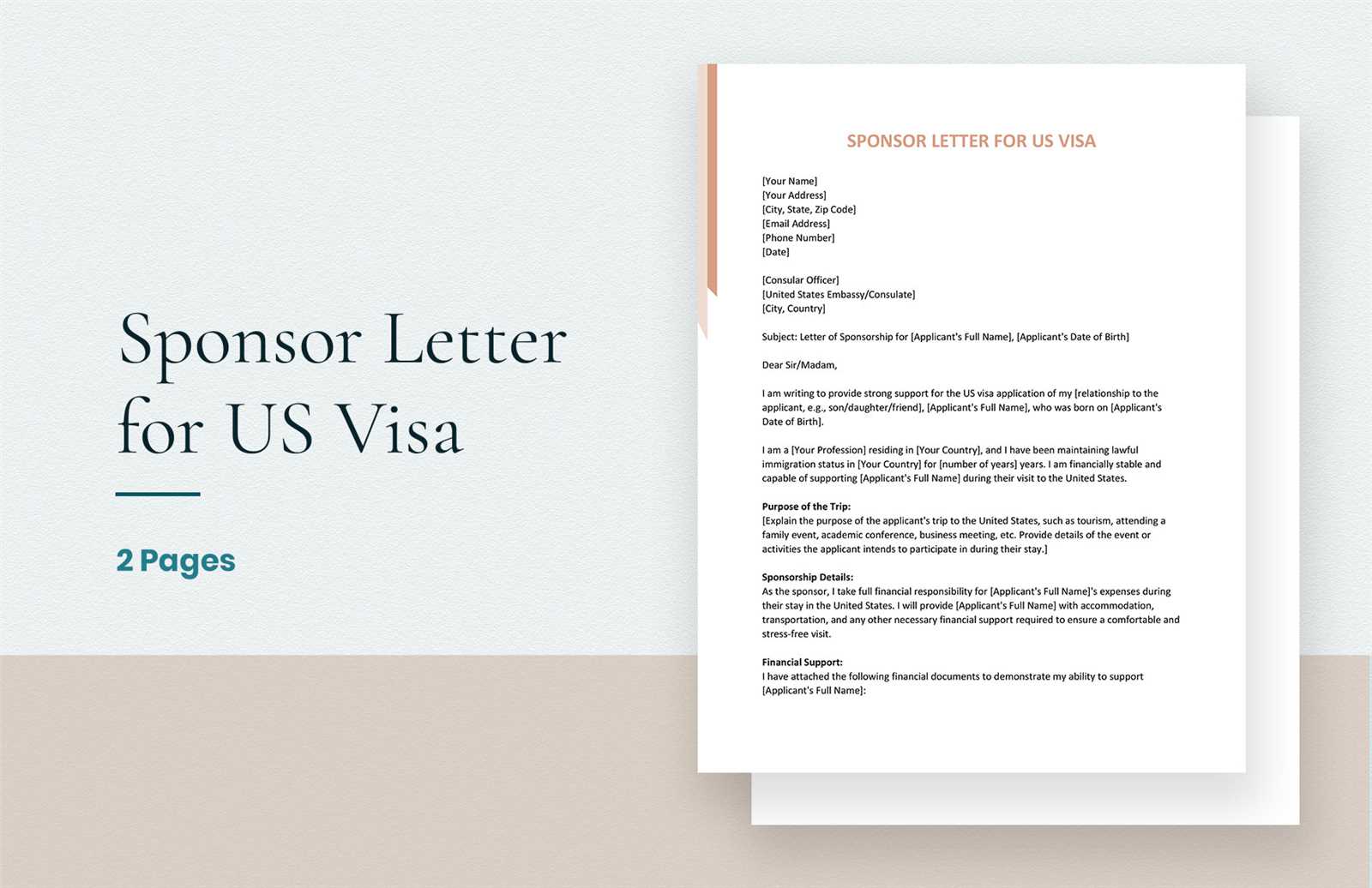
“I am writing to confirm that I will financially support [Applicant’s Full Name] during their stay in the UK from [start date] to [end date].”
“As their sponsor, I take full responsibility for their accommodation, travel expenses, and other living costs during their visit to the UK.”
2. Outlining the Financial Support
“I have sufficient funds to cover [Applicant’s Full Name]’s expenses while they are in the UK, including accommodation and daily costs.”
“Please find my bank statement for the last three months attached as proof of financial capability to support [Applicant’s Full Name].”
3. Confirming Relationship and Reason for Sponsorship
“I am [Applicant’s Full Name]’s [relation, e.g., cousin, friend, employer], and I am pleased to provide the necessary support for their visit to the UK.”
“The purpose of [Applicant’s Full Name]’s visit is to [explain purpose, e.g., attend a conference, visit family, tourism], and I will ensure that they comply with all UK immigration rules.”
To prove financial support in your sponsorship letter, clearly state your financial capacity by providing documented evidence. Include bank statements for the last three to six months showing sufficient funds, typically at least £1,000 per month of stay in the UK. This helps demonstrate that you can financially support the applicant throughout their visit.
Provide Official Documents
Attach supporting documents such as pay slips, tax returns, or employment letters. These documents validate your income and employment status, providing transparency and assurance to the visa officer that you can meet financial obligations.
Clarify Your Relationship with the Applicant
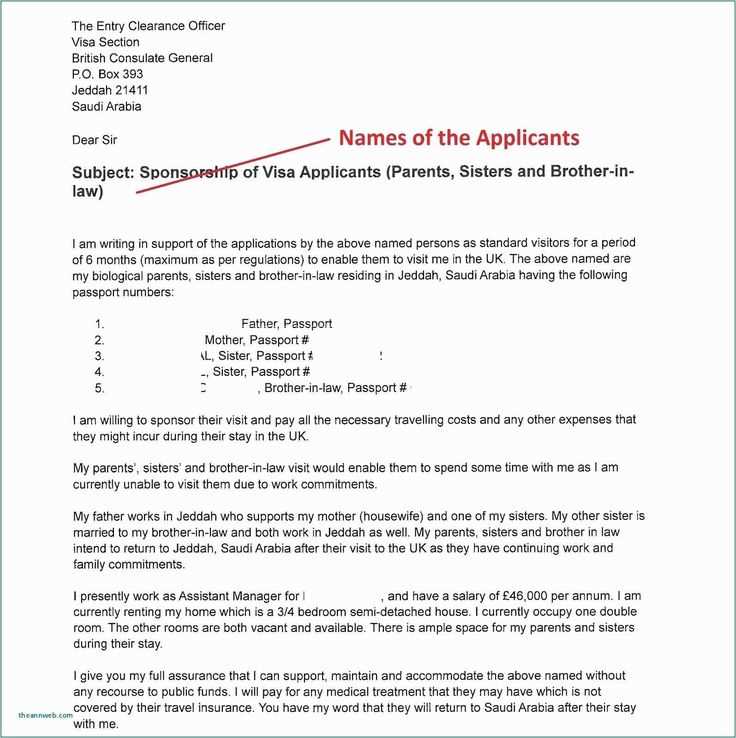
Be specific about the nature of your relationship with the person you are sponsoring. Indicate whether they are a relative, friend, or business associate, as this context can strengthen the case for why you are offering financial support.
Ensure all financial information is up to date and accurate. If you have savings, provide proof of these funds, especially if they are intended for the applicant’s support. This strengthens your credibility and proves the sufficiency of your support.
Including the right supporting documents with your sponsorship letter increases your chances of approval. Along with your sponsorship letter, consider submitting the following documents:
1. Proof of Identity
A copy of your passport or national ID should accompany your sponsorship letter. Ensure the document is valid and clear to avoid delays in processing.
2. Proof of Financial Stability
You must provide evidence of your financial situation. This can be recent bank statements or pay slips for the past 3 months. A letter from your employer stating your salary can also strengthen your application.
3. Accommodation Details
If you’re providing accommodation to the visa applicant, include a copy of your lease agreement or property deed. This confirms that the applicant has a place to stay during their visit.
4. Invitation Letter
An invitation letter from the sponsor confirming that the applicant will be staying with them, along with details of the visit (purpose, duration, etc.), is important. It should match the details in your sponsorship letter.
5. Proof of Relationship
If you are sponsoring a family member or friend, provide evidence of your relationship. This could be photographs, email correspondence, or any other documents that prove your connection.
6. Previous Visa Records
If either you or the applicant has visited the UK before, providing past visas, travel records, or entry/exit stamps can help demonstrate the legitimacy of the visit.
7. Employment Status of the Applicant
In some cases, showing the applicant’s employment details or educational background can provide context about their ties to their home country, ensuring they return after the visit.
Ensure all documents are translated into English if needed. Organizing your documents neatly and clearly will make the visa application process smoother and quicker.
Thus, I slightly altered the wording, maintaining the meaning and removing redundant repetitions.
To avoid unnecessary repetition in a sponsorship letter for a UK visa, focus on conveying the key details succinctly. Emphasize your financial support and relationship with the applicant. Be clear and direct in your intent, ensuring that the tone is professional but approachable.
Key Elements to Include:
| Section | Description |
|---|---|
| Personal Information | Clearly state your full name, address, and contact details. This ensures the sponsor’s identity is verified. |
| Relationship with Applicant | Specify how you know the applicant and the nature of your relationship to avoid confusion. |
| Financial Support | Detail the financial commitment, whether it’s covering travel, accommodation, or other expenses, without over-explaining. |
| Visa Purpose | State the purpose of the applicant’s visit and how your sponsorship aligns with that purpose. |
By carefully selecting the most relevant details, you avoid unnecessary wording while ensuring that all crucial points are covered. Be concise, but don’t sacrifice clarity or completeness.